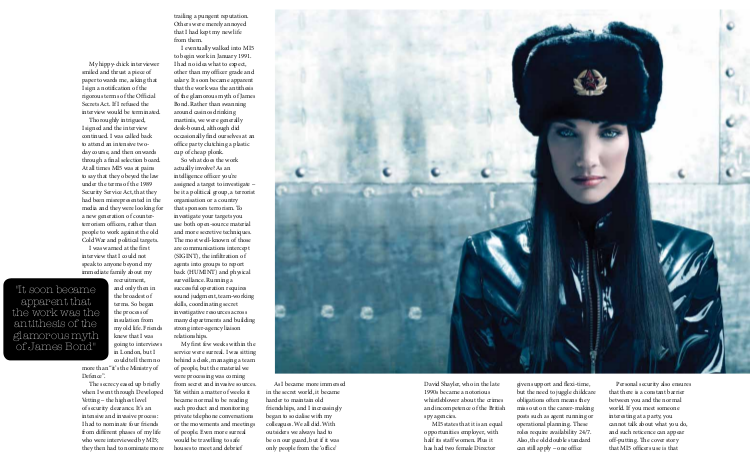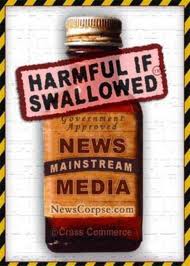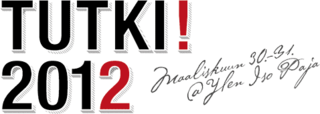Article on life as a spy in Emirates women magazine

 click on the image above or here to download the entire article as a PDF
click on the image above or here to download the entire article as a PDF
Article on life as a spy in Emirates women magazine

 click on the image above or here to download the entire article as a PDF
click on the image above or here to download the entire article as a PDF
Whistleblowers want the sun and the moon — or at least they want to get their information out there, they want to make a difference, they want a fair hearing, and they don’t want to pay too high a personal price for doing so.
Is that too much to ask? The decision to expose criminality and bad practice for the public good has serious, life-changing implications.
By going public about serious concerns they have about their workplace, they are jeopardising their whole way of life: not just their professional reputation and career, but all that goes with it, such as the ability to pay the mortgage, their social circle, their family life, their relationship… Plus, the whistleblower can potentially risk prison or worse.
 So, with these risks in mind, they are certainly looking for an avenue to blow the whistle that will offer a degree of protection and allow them to retain a degree of control over their own lives. In the old days, this meant trying to identify an honourable, campaigning journalist and a media organisation that had the clout to protect its source. While not impossible, that could certainly be difficult, and becomes increasingly so in this era of endemic electronic surveillance.
So, with these risks in mind, they are certainly looking for an avenue to blow the whistle that will offer a degree of protection and allow them to retain a degree of control over their own lives. In the old days, this meant trying to identify an honourable, campaigning journalist and a media organisation that had the clout to protect its source. While not impossible, that could certainly be difficult, and becomes increasingly so in this era of endemic electronic surveillance.
Today the other option is the secure, high-tech publishing conduit, as trail-blazed by Wikileaks. While this does not provide the potential benefits of working with a campaigning journalist, it does provide anonymity and a certain degree of control to the modern whistleblower, plus it allows their information to reach a wide audience without either being filtered by the media or blocked by government or corporate injunctions.
As someone who has a nodding acquaintance with the repercussions of blowing the whistle on a secret government agency, I have liked the Wikileaks model since I first stumbled across it in 2009.
 As with most truly revolutionary ideas, once posited it is blindingly obvious.
As with most truly revolutionary ideas, once posited it is blindingly obvious.
Never before has this been technically possible — the idea that a whistleblower’s information could be made freely available to the citizens of the world, in order to inform their democratic choices, with no blockage, not censorship, no filtering or “interpretation” by the corporate media.
This is particularly relevant in an age when the global media has been consolidated in the hands of a few multinationals, and when these multinationals have a certain, shall we say “cosy”, relationship with many of top our politicians and power elites.
The control of the mainstream media by the spooks and governments has been the focus of many of my recent talks. These corrupt inter-relationships have also been recently laid bare with the News International phone-hacking scandals.
The days of garnering news from one favoured paper or TV bulletin are long gone. Few people now trust just one media outlet — they skip across a variety of news sources, trying to evaluate the truth for themselves. But even that can be problematic when something big occurs, such as the “justification” for the invasion of Iraq or Libya, and the current beat of war drums against Iran, when the corporate media mysteriously achieves a consensus.
Hence the democratic disconnect, hence the distrust, and hence (in part) the plummeting profits of the old media.
Wikileaks is based on a simple concept — it allows the people to read the source material for themselves and make up their own minds based on real information. This led to exposure of all kinds of global nasties way before the massive 2010 US data-dump.
Despite this approach, the impact was initially subdued until Wikileaks collaborated with the old media. This, as we all know, did indeed produce the coverage and awareness of those issues deemed important as it was filtered through the MSM. This has also inevitably lead to tensions between the new model hacktivists and the old-school journalists.
 No government, least of all the USA, likes to have demands for justice and transparency forced upon it, and the push back since 2010 has been massive across the world in terms of an apparently illegal financial blockade, opaque legal cases and a media backlash. Certain of Wikileaks’s erstwhile media partners have collaborated in this, turning on one of their richest sources of information in history.
No government, least of all the USA, likes to have demands for justice and transparency forced upon it, and the push back since 2010 has been massive across the world in terms of an apparently illegal financial blockade, opaque legal cases and a media backlash. Certain of Wikileaks’s erstwhile media partners have collaborated in this, turning on one of their richest sources of information in history.
However, Wikileaks is more than a media source. It is a whole new model — a high-tech publisher that offers a safe conduit for whistleblowers to cache and publicise their information without immediately having to overturn (and in some cases risk) their lives.
For this work, Wikileaks has over the years won a number of internationally prestigious journalism awards.
Inevitably, critics in the mainstream media seem to want to have their cake and eat it too: one early partner, the New York Times, has written that it doesn’t recognise Wikileaks as a journalist organisation or a publisher — it is a source, pure and simple.
Either way, by saying this the media are surely shooting themselves in the corporate feet with both barrels. If Wikileaks is indeed “just” a source (the NYT seems to be blithely forgetting that good journalism is entirely dependent on its sources), then the media are breaking their prime directive: protect a source at all costs.
However, if Wikileaks is a journalism or publishing organisation and as such is being targeted by the US government, then all other media are surely equally at risk in the future?
By not standing up for Wikileaks in either capacity, it appears that the old media have a death wish.
Over the years whistleblowers around the world have demonstrated their trust in Wikileaks, as it was set up by someone emerging from the original bona fide hacker community. And rightly so — let’s not forget that no source has been exposed through the failure of the organisation’s technology.
Many media organisations rushed to emulate its success by trying to set up their own “secure” whistleblowing repositories. What the media execs failed to understand was the hacker ethos, the open source mentality: they went to their techie department or commercial IT service providers and said “we want one”, but failed to understand both the ethos and the security concerns around closed, proprietary software systems, often channelled through the post-Patriot Act, post-CISPA USA.
Other, apparently well-meaning organisations, also tried to emulate the Wikileaks model, but most have died a quiet death over the last year. Perhaps, again, for want of real trust in their origin or tech security?
Why on earth would any security-conscious whistleblower, emerging out of a government, military or intelligence organisation, trust such a set-up? If someone comes out of such an environment they will know all-too-well the scale of the push-back, the possible entrapments, and the state-level resources that will be used to track them down. They either need an über-secure whistleblowing platform, or they need journalists and lawyers with fire in their belly to fight the fight, no matter what.
 So now to OpenLeaks — apparently the brainchild of Wikileaks defector Daniel Domsheit-Berg. He and the shadowy “Architect” famously fell out with Julian Assange in late 2010, just when the political heat was ramping up on the organisation. They left, reportedly taking some of the crucial coding and a tranche of files with them, and Domsheit-Berg decided to set up a rival organisation called OpenLeaks. As a result of his actions, Domsheit-Berg was uniquely cast out of the international hacker group, the CCC in Berlin.
So now to OpenLeaks — apparently the brainchild of Wikileaks defector Daniel Domsheit-Berg. He and the shadowy “Architect” famously fell out with Julian Assange in late 2010, just when the political heat was ramping up on the organisation. They left, reportedly taking some of the crucial coding and a tranche of files with them, and Domsheit-Berg decided to set up a rival organisation called OpenLeaks. As a result of his actions, Domsheit-Berg was uniquely cast out of the international hacker group, the CCC in Berlin.
He now seems to have been welcomed back into the fold and OpenLeaks appears, finally, to be ready to receive whistleblower information.
However, there is a crucial difference between the two organisations. Where Wikileaks wants to lay the information out there for public evaluation, OpenLeaks will merely act as a repository for certain approved mainstream media organisations to access. We are back to the original blockage of the corporate media deciding what information we, the people, should be allowed to ingest.
I would not wish to comment on Domsheit-Berg’s motivation, but to me this seems to be an even worse option for a whistleblower than directly contacting a campaigning journalist with a proven track record of covering hard-core stories and fighting for the cause.
 With OpenLeaks, the whistleblower loses not only the automatic widespread dissemination of their information, but also any semblance of control over which journalists will be working on their story. Their information will be parked on the website and anyone from pre-selected media organisations will be able to access, use and potentially abuse it.
With OpenLeaks, the whistleblower loses not only the automatic widespread dissemination of their information, but also any semblance of control over which journalists will be working on their story. Their information will be parked on the website and anyone from pre-selected media organisations will be able to access, use and potentially abuse it.
One could say that OpenLeaks operates as a secure staging platform where a whistleblower can safely store sensitive documents and information.… but the founder allegedly removed and destroyed sensitive files from Wikileaks when he jumped ship in 2010. Could any whistleblower really trust that OpenLeaks would not similarly “disappear” shit-hot information in the future?
Plus, there is the added worry for any rightly-paranoid whistleblower that the founder of OpenLeaks so easily abandoned Wikileaks when under pressure. Who’s to say that this would not happen again, if the full might of the Pentagon were brought to bear on OpenLeaks?
OpenLeaks offers neither the personal support of working with a trusted journalist and a media organisation with the clout to fight back, nor does it provide full disclosure to the wider public to side-step potential media self-censorship and government law suits, as the original Wikileaks model does.
As such OpenLeaks seems, at least to this particular whistleblower, to be an evolutionary blip — a retrograde step — in the quest for justice and accountability.
Following on from my talk at the Norwegian SKUP investigative journalism conference in March, I was invited onto the Anne Lindmo Show in Norway on 4 May.
Anne is one of the most famous and respected journalists in Norway, and her chat show is extremely popular on prime time NRK TV on Friday nights. We had a lively session discussing the world of spying, what it was like to blow the whistle and go on the run, and the personal price that has to be paid.
Here’s the link to the whole show, and here’s my segment:
Lindmo interview on Norwegian TV from Annie Machon on Vimeo.
Here is the film of the debate at the SKUP investigative journalism conference in Norway on 25 March 2012:
I had an immensely stimulating time during my recent mini-tour of Scandinavian investigative journalism conferences, meeting informed, interesting, and interested people.
The focus of my talks was the nexus between the intelligence world and the media — lessons I had learned, researched and deduced during the whistleblowing years and beyond. I have heard so many hair-raising media stories over the years.…
And, having listened to the experiences of journalists from a wide variety of other countries, it seems I am on the right track.
 First stop was the Grav conference in Sweden, where I gave a talk and had the pleasure of meeting investigative journalists who confirmed what I was saying, even if some of them didn’t think I had quite gone far enough! We also had fun at the “mingel” evening.
First stop was the Grav conference in Sweden, where I gave a talk and had the pleasure of meeting investigative journalists who confirmed what I was saying, even if some of them didn’t think I had quite gone far enough! We also had fun at the “mingel” evening.
Next stop, next day, was the SKUP conference in Norway where I did a talk, and also a debate about the media and whistleblowers. Note to self: never, ever agree to do a morning debate after the legendary SKUP party the night before.
Finally, last weekend, I visited the Tutki 2012 journalism conference in Finland (Download Helsinki_Talk). The response was overwhelmingly positive, and once again I had confirmation of what I was saying from the journalists themselves.
So what can we do about this situation? I shall keep spreading the word, and the journalists themselves just need to keep saying a resounding “no” to the inducements, at least if they want to work on meaningful investigations. And what real journalist doesn’t, au fond?
Next stop Geneva, which is why I’m limbering up with the French.
How strange to stumble across this article in the Guardian newspaper yesterday, which describes a journalist’s justifiably paranoid experiences interviewing David Shayler and me back in 2000 while writing an article for Esquire magazine.
The author, Dr Eamonn O’Neill, now a lecturer in journalism at Strathclyde University, spent a few days with us in London and Paris way back when.
 The Esquire article highlights the paranoia and surveillance that we had to live with at the time, and the contradictory briefings and slanders that were coming out of the British establishment and the media. O’Neill also intelligently tries to address the motivations of a whistleblower.
The Esquire article highlights the paranoia and surveillance that we had to live with at the time, and the contradictory briefings and slanders that were coming out of the British establishment and the media. O’Neill also intelligently tries to address the motivations of a whistleblower.
When it was published I was mildly uncomfortable about this article — I felt it didn’t do David full justice, nor did it appear to get quite to the heart of the issues he was discussing. I suppose, at the time, I was just too enmeshed in the whole situation.
Now, with hindsight, it is more perspicacious than I had thought. And rather sad.
This article is a timely reminder of how vicious the establishment can be when you cause it embarrassment and pain; the treatment meted out to David Shayler was brutal. And yet nothing has changed to this day, as we can see with the ongoing pursuit and vilification of Wikileaks.
 My grand tour around Scandinavia continues next weekend, when I shall be giving the opening keynote at the Tutki!2012 investigative journalism conference in Helsinki. Looking forward to the conference!
My grand tour around Scandinavia continues next weekend, when I shall be giving the opening keynote at the Tutki!2012 investigative journalism conference in Helsinki. Looking forward to the conference!
Off on my travels again at the end of the week, with two keynotes at Scandinavian journalism conferences.
 I shall first be speaking at the Grav conference in Sweden on Friday 23 March.
I shall first be speaking at the Grav conference in Sweden on Friday 23 March.
 Topics under discussion will include everything from security and intelligence to the war on terror, civil liberties to ethics and media freedoms, government accountability to whistleblowing and Wikileaks.
Topics under discussion will include everything from security and intelligence to the war on terror, civil liberties to ethics and media freedoms, government accountability to whistleblowing and Wikileaks.
On Saturday I travel on to Norway to speak at the SKUP conference to give a talk and also on Sunday morning to participate in a panel discussion about all things whistleblowing and Wikileaks. I gather that such discussions can get quite, um, lively.
I’m looking forward to an interesting and stimulating weekend.
Outrage continues to swell about the peremptory extradition of British citizens to face trial on tenuous charges abroad.
Thanks to the tireless campaigning of distraught family members, a growing anger in the UK press, and indignant questions and debates in Parliament — even our somnambulant MPs have roused themselves to state that Something Must be Done — the Extradition Act 2003 is now centre stage, and reform of the law will no doubt occur at some point.
As there is a growing consensus, why the delay? I have a theory, but first let’s review some of the most troubling recent cases.
 The case that really brought the issue to widespread public attention is the decade-long extradition battle of Gary McKinnon. With this sword of Damocles hanging over his head for so long, poor Gary has already effectively served a 10-year sentence, uncertain of his future and unable to work in his chosen profession. Thanks to the indefatigable campaigning of his mother, Janis Sharp, his case has received widespread support from the media and politicians alike.
The case that really brought the issue to widespread public attention is the decade-long extradition battle of Gary McKinnon. With this sword of Damocles hanging over his head for so long, poor Gary has already effectively served a 10-year sentence, uncertain of his future and unable to work in his chosen profession. Thanks to the indefatigable campaigning of his mother, Janis Sharp, his case has received widespread support from the media and politicians alike.
Despite this the Home Secretary, Theresa May (who has recently been working so hard in Jordan to protect the rights of Abu Qatada), has dragged her feet abominably over making a decision about whether Gary should be extradited to the US to face a possible 70-year prison sentence — even though the UK investigation into his alleged crime was abandoned way back in 2002.
 Then there is the more recent case of student Richard O’Dwyer, wanted in the US even though he lives in the UK and has broken no British laws. He is facing a 10 year maximum security sentence if extradited. Once again, his mother, Julia, is tirelessly fighting and campaigning for her son.
Then there is the more recent case of student Richard O’Dwyer, wanted in the US even though he lives in the UK and has broken no British laws. He is facing a 10 year maximum security sentence if extradited. Once again, his mother, Julia, is tirelessly fighting and campaigning for her son.
Most recently, Chris Tappin, a retired businessman and golf club president, has been shipped off to a Texas high security penitentiary following what sounds like a US entrapment operation (a technique not legally admissable in UK courts), and faces a 35 year sentence if convicted.
 Despite having turned himself in, this elderly gent, who walks with the aid of a cane, is considered such a flight risk that he was last week denied bail. Once again, his wife Elaine has come out fighting.
Despite having turned himself in, this elderly gent, who walks with the aid of a cane, is considered such a flight risk that he was last week denied bail. Once again, his wife Elaine has come out fighting.
My heart goes out to all these women, and I salute their tenacity and bravery. I remember living through a similar, if mercifully briefer, four months back in 1998 when the UK government tried and failed to extradite David Shayler from France to the UK to stand trial for a breach of the OSA. I remember with crystal clarity the shock of the arrest, the fear when he disappeared into a foreign legal system without trace, the anguish about his life in an alien prison.
 And I remember the frightening moment when I realised I had to step up and fight for him — the legal case, dealing with MPs and the endless media work, including the terror of live TV interviews. And all this when you are worried sick about the fate of a loved one. Shall I just say it was a steep learning curve?
And I remember the frightening moment when I realised I had to step up and fight for him — the legal case, dealing with MPs and the endless media work, including the terror of live TV interviews. And all this when you are worried sick about the fate of a loved one. Shall I just say it was a steep learning curve?
In the wake of the recent extradition cases, there have been questions in Parliament, motions, debates, reviews (Download Review), and there is an ongoing push for an urgent need for reform. And no doubt this will come, in time.
So why the delay? Why not change the law now, and prevent McKinnon, O’Dywer and many others being sacrificed on the American legal altar — the concept of “judicial rendition”, as I have mentioned before.
Well, I have a theory, one derived from personal experience. The British media — most notably the Daily Mail — inveigh against the unilateral extradition of UK citizens to the USA’s brutal prison régime. There is also some concern about extradition to other European jurisdictions — usually on the fringes to the south and east of the continent, regions where the British seem to have a visceral fear of corrupt officials and kangaroo courts.
But what many commentators seem to miss is the crucial legal connection — the extradition arrangements that ensure Brits can be shipped off to the US and many other legal banana republics comparable legal systems to face outrageous sentences are, in fact, embedded within the Extradition Act 2003. This is the act that enshrined the power of the European Arrest Warrant, the the act that was rushed through Parliament in the midst of the post‑9/11 terrorism flap.
And, of course, this is the very act that is currently being used and abused to extradite Julian Assange to Sweden merely for police questioning (he has not even been charged with any crime), whence he can be “temporarily surrendered” to the delights of the US judicial process. Hmm, could this possibly be the reason for the delay in reforming the Act?
 Let me guess, you think this is beginning to sound a bit tin-foil hat? Surely it is inconceivable that the British politicians and judges would delay righting a flagrant legal wrong that manifestly results in innocent people being unjustly extradited and prosecuted? Surely our government would move swiftly to protect its citizens?
Let me guess, you think this is beginning to sound a bit tin-foil hat? Surely it is inconceivable that the British politicians and judges would delay righting a flagrant legal wrong that manifestly results in innocent people being unjustly extradited and prosecuted? Surely our government would move swiftly to protect its citizens?
As I mentioned, my theory stems from personal experience. Once again delving into the mists of time, in 1997 David Shayler blew the whistle on the wrongful conviction on terrorist charges of two innocent Palestinian students, Samar Alami and Jawad Botmeh. Their lawyer, the excellent Gareth Peirce, was immediately on the case, but the UK government dragged its heels for a year. Why?
During that time, the UK government tried to have Shayler extradited from France to the UK to stand trial. Government lawyers were confident of victory and delayed a decision on the students’ appeal against their convictions until the whistleblower was safely incarcerated in HMP Belmarsh, awaiting trial.
Except it all went wrong, and the French freed Shayler for being manifestly a political whistleblower, which in their legal opinion was not an extradictable offence. Only at that point did the UK government lawyers begin to work with Peirce on the Palestinian case, details of which can be found here.
 So my theory is that the UK is dragging its feet about reforming the preposterous Extradition Act until it has Assange safely over in Sweden. However, they may be counting their chickens prematurely — and they should never, ever overlook the determination of the campaigning mother, in this case Christine Assange.
So my theory is that the UK is dragging its feet about reforming the preposterous Extradition Act until it has Assange safely over in Sweden. However, they may be counting their chickens prematurely — and they should never, ever overlook the determination of the campaigning mother, in this case Christine Assange.
But in the meantime, while the UK continues to prostitute itself to the USA, how many more innocent people will have to suffer unjust and unjustifiable extradition?
Writers of the world, beware. A new threat to our freedom of speech is looming and, for once, I am not inveighing against the Official Secrets Act.
Over recent years the UK has rightly earned a pungent reputation as the libel capital of the world. And now it appears that this wonderful practice is going “offshore”.
How did this whole mess begin? It turned out that someone in the Middle East could take exception to a book written and published about them in the USA. US law, somewhat surprisingly considering its current parlous state, provided no route to sue. However, some bright legal spark decided that the UK courts could be used for redress, provided the offending book had been sold in the UK — even if only a handful of second-hand books had been sold over Amazon.co.uk — and Mr Justice Eady helped the process along magnificently.
And so was born the concept of “libel tourism”. Satirical current affairs magazine Private Eye has long been campaigning against this, other UK news outlets gradually followed suit, and the UK government is finally taking steps to rein in these egregious, if lucrative, legal practices.
 But, hey, that’s precisely when your offshore crown dependencies, otherwise known as British tax havens, come into their own. The UK has for years turned a blind eye to the dubious financial practices of these islands, the most geographically convenient being the Channel Islands and the Isle of Man, where the attitude to self-regulation makes the practices of the Square Mile look positively Vestal.
But, hey, that’s precisely when your offshore crown dependencies, otherwise known as British tax havens, come into their own. The UK has for years turned a blind eye to the dubious financial practices of these islands, the most geographically convenient being the Channel Islands and the Isle of Man, where the attitude to self-regulation makes the practices of the Square Mile look positively Vestal.
Now it appears that Guernsey is looking to become a hub of another lucrative offshore practice: libel tourism.
Guernsey has its own parliament — the States — and can make its own laws. So as the libel door closes on the UK mainland, a firm of offshore tax lawyers has identified a wonderful business opportunity.
Jason Romer is the managing partner and intellectual property specialist at the large “wealth management” legal firm Collas Crill. According to his firm’s website, he also, coincidentally, sits on the island’s Commercial IP Steering Group and the Drafting Sub-Committee, and is thus conveniently on hand to steer the new legislation through the States.
 Also coincidentally, he appears to be an enthusiastic advocate of Eady’s infamous “super-injunction” régime which has had such a chillingly expensive effect on the British media in the last decade.
Also coincidentally, he appears to be an enthusiastic advocate of Eady’s infamous “super-injunction” régime which has had such a chillingly expensive effect on the British media in the last decade.
So, if this law is passed, anyone, anywhere around the world will be able (if they can afford it) to register their “image rights” in Guernsey. These rights can even last indefinitely after the original owner’s death.
This means that anyone, anywhere, who feels that their “image” has been inappropriately reproduced/copied/pirated — the correct legal terminology is hazy — can then sue through the Guernsey courts for redress. This could potentially be a powerful new global tool for the suppression of free speech. As public outcry swells internationally against the US IP laws, SOPA and PIPA, and across Europe against the utterly undemocratic ACTA, this new law is a giant leap precisely in the wrong direction.
Guernsey, my island of birth, has changed out of all recognition over the last thirty years. Ever since the 1980s infestation of offshore bankers and trust fund lawyers, it has been tarmac-ed over by greed and social division. Before then it was proud of its egalitarianism, Norman-French heritage, beautifully anachronistic pace of life, and an economy based on tomatoes and tourism.
Now, if this law is passed, it will be known for its economy based on rotten financial apples and offshore libel tourism.
I just wanted to get that out of my system now — while I can still freely express my thoughts and before the island can sue me for damaging its “image rights”.…
Reviewing “The Art of Betrayal” on Press TV’s Epilogue with former MP Derek Conway and Glenmore Treanar-Harvey.
I recently did the opening keynote at the Big Dig investigative journalism conference in Copenhagen. Thanks to the organisers for a wonderful weekend!
Off tomorrow to speak at the Mediafabric conference in Prague.
Should be a good one — all about the media, journalists, technologists, designers, hackers, and all points in between!
The conference has been organised by Sourcefabric, and there will be live streaming here.
I had a fantastic time at the Global Investigative Journalism Conference in Kiev last weekend. A huge well done to the organisers for a great four days, and I loved having the chance to meet so many interesting and interested people from across the world!
I was invited to give the opening keynote speech (video to follow), where I discussed some of my experiences from the MI5 whistleblowing years, but then went on to apply the harsh lessons learned to the current situation vis a vis the issue of spy influence on the media today and the thorny issue of whistleblowing and the protection of sources.
Part of my talk focused on the control of the media by the spies in Britain. As I have written before, this is very much a “carrot and stick” scenario: the soft aspect, of course, being cosy chats with selected journalists, well-timed career-enhancing scoops, as well as an increasingly unhealthy journalistic dependence on briefings coming out of the intelligence world and government.
The stick aspect includes the battery of harsh laws that can be called upon to suppress free reporting in the UK, which sometimes leads to self-censorship by the media. These laws include:
 How do I know all this? Well, as you can see from many of the links in the above list, I’ve lived through much of this and have followed with great interest similar and related cases over the years. More information about these issues can be found in this excellent report produced by Article 19 and Liberty over a decade ago. The situation has not improved.
How do I know all this? Well, as you can see from many of the links in the above list, I’ve lived through much of this and have followed with great interest similar and related cases over the years. More information about these issues can be found in this excellent report produced by Article 19 and Liberty over a decade ago. The situation has not improved.
While in Kiev I attended an excellent session where two Russian journalists discussed the ramifications of reporting on the modern incarnation of the Russian intelligence agency, the FSB.
I was somewhat startled to hear that even in Russia journalists have more legal protection than those in the UK — ie they face no criminal legal sanction if they report whistleblower material from the Russian spy agencies. In the UK journalists potentially face 2 years in prison for doing so, under the invidious Section 5 of the 1989 OSA.
Way to go, British democracy.
